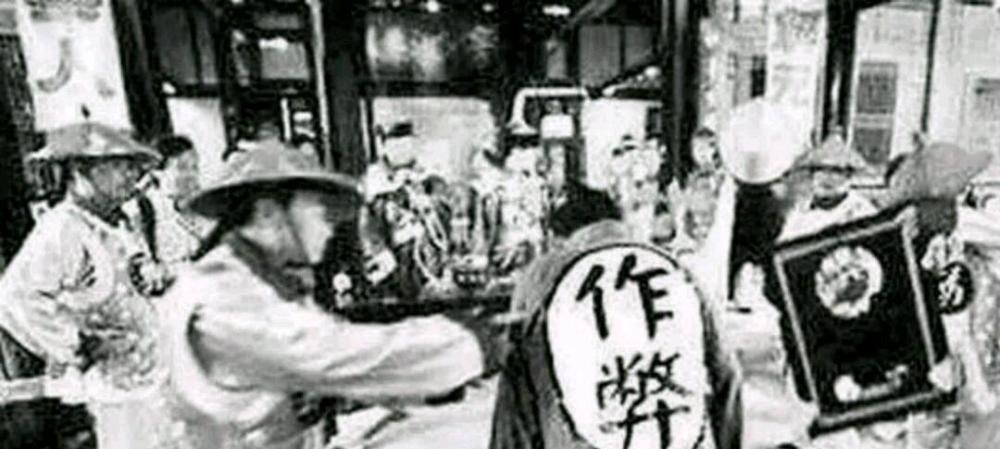I can say with certainty that there will be no problem of excessive sentencing.
By the time the Xianfeng Emperor was in power, the Qing Dynasty was already in ruins, the government and the opposition were full of evils, officials followed the old ways, adhering to the purpose of "prostrating their heads more and talking less, not seeking merit but seeking no fault", the state apparatus was not working well, and there was a scene of decay!
At this time, the Xianfeng Emperor was trying to select talents who could "turn the tide of the tide and help the building fall" through the imperial examination. Unexpectedly, at such a time, the largest case of fraud in the history of the Qing Dynasty occurred in Beijing at the foot of Xianfeng.

Causes and circumstances of the incident.
Candidate Luo Hongyi wanted to seek a future through the imperial examination, and knowing that he did not have this strength, he wanted to achieve this goal by cheating to buy the same examiner. To this end, he found a fellow villager, Li Heling. Li Heling thought that he would be sent by the emperor to preside over the examination work, and helping him to get a person should be a piece of cake, so he did not resign and promised to accept it, and Luo Hongyi also promised to pay five hundred taels of silver after the matter was completed.
Soon the examiner arrangements for the Shuntian examination hall all came down, and there was no Li Heling among them. So Li Heling went to find the examiner Pu An in the examination room, hoping that he could open his face, and Pu An could not wipe his face and agreed. When reading the papers, he found Luo Hongxuan's examination papers, and even if the literary skills were not enough, he wrote a good comment for him and sent them to the chief examiner Bai Yao for review.
Bai Yao naturally saw that the examination papers were unqualified and did not meet the admission criteria, so he sent Jia Ding to explain to Urayasu and entered the examination papers into another book (no admission).
Unexpectedly, when Jia Ding (Bai Yao's confidant) returned, he helped Pu An speak, thinking that Bai Ye should give his colleagues a face, and the test paper did not seek a good rank, as long as he crossed the line. Bai Yao did not hold on for a while, and also thought that it was not worth it to deal with people because of this small matter, so he complied and gave Luo Hongyi a two-hundred-and-thirty-eight person.
After the fact, Luo Hongxuan did pay five hundred taels of silver, Li Heling kept two hundred taels himself, Pu An took three hundred taels, and Bai Yao did not get anything.
The result?
After the Incident, Luo Hongxuan, Li Heling, Jia Ding, Pu An, and Bai Ye were all arrested and imprisoned. Jia Ding died in prison soon after.
According to the Shunzhi Emperor's ancestral system of "all frauds in the field are executed", there is no controversy over the execution of Luo Hongxuan, Li Heling, and Pu An, but everyone generally feels that Bai Ye should not be sentenced to death for two reasons
One: Bai Ye did not accept bribes, but only assisted the candidates in cheating because of the face problem, and should be dealt with lightly. Moreover, subordinates who commit crimes against Fa Bai are at best guilty of negligence and dereliction of duty, and at most they will remove him from their official positions, and the crime will not lead to death.
An said that as long as officials at his level do not conspire against him, they will not be guilty of capital punishment, and according to the "Great Qing Law" that the death penalty is not applicable to eight kinds of people, such as "kinship, family, sage, ability, merit, nobility, diligence, and guest", Bai Ye can be on the same side as "virtuous, able, meritorious, and noble", so he should not be sentenced to death.
However, the Xianfeng Emperor accepted Sushun's recommendation to "severely punish the law" and sentenced all four to death, and Bai Bao became the only scholar of the Qing dynasty who was executed for cheating in the field.
Although the feelings are excusable, the Law is difficult to forgive, and when I think of this, I not only weep. - Records of Emperor Wenzong of the Qing Dynasty
It can be seen that emotionally Xianfeng still hopes that Bao Bai will have a life, but the law is not merciful.
After this case, dozens of people were also involved, one after another, exiled, dismissed, demoted, and fined, and the number of people handled in this case and the high level of officials were unprecedented in the Qing Dynasty.
How to evaluate?
I think the handling of the Pengwu Kechang case is very appropriate, and during the Qing Dynasty to Daoguang and Xianfeng, officials were not surprised by the fraud in the section field, and fraud has become a common phenomenon. The handling of this matter played a great role in purging the imperial examinations of the late Qing Dynasty, and made the late Qing Dynasty department field look new.
Since then, Si Wenheng has been afraid of the law and the field has been purged.
I am a historian, welcome to leave a message, like, pay attention, thank you.
bibliography
Draft History of the Qing Dynasty